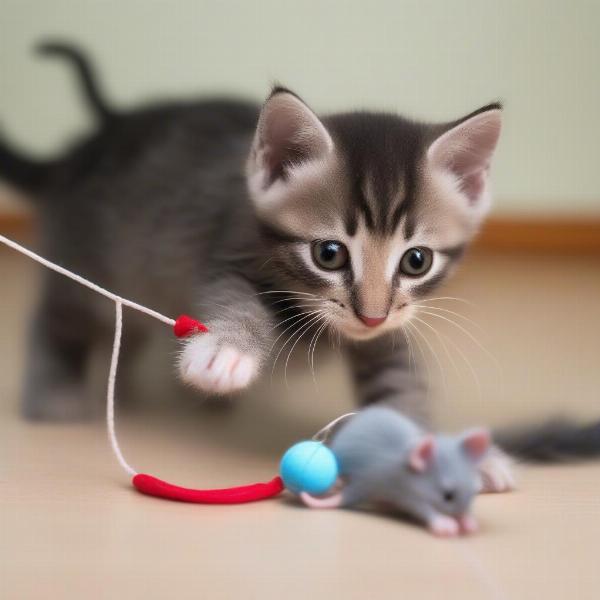Kittens and dog milk – a combination that often raises questions for pet owners. Can kittens drink dog milk in a pinch? Is it safe, or are there potential health risks? This article delves into the specifics of canine and feline nutritional needs to answer the question, “can kittens drink dog milk?”, offering practical advice for pet owners facing this situation.
Dog milk and cat milk differ significantly in composition. While both provide essential nutrients for newborns, the balance of these nutrients is tailored to the specific needs of each species. Cat milk, for instance, contains higher levels of protein, fat, and calories than dog milk, crucial for the rapid growth and development of kittens. Dog milk, on the other hand, is less calorie-dense and has a different protein and fat profile. Therefore, while dog milk might seem like a viable substitute in an emergency, it lacks the crucial nutrients a kitten needs to thrive.
The Nutritional Differences Between Dog Milk and Cat Milk
The key difference lies in the nutritional content. Kittens require a specific balance of nutrients that dog milk simply doesn’t provide. For example, taurine, an essential amino acid, is crucial for feline heart and eye health. Cat milk is rich in taurine, while dog milk is not. This deficiency can lead to serious health problems in kittens if they are fed dog milk long-term.
Furthermore, the fat and protein levels in dog milk are significantly lower than in cat milk. This discrepancy means kittens fed dog milk won’t receive the necessary energy and building blocks for proper growth. They might become malnourished and fail to reach developmental milestones.
What to Do If a Kitten Needs Milk
If you find yourself caring for a kitten without access to cat milk, the best option is kitten milk replacer (KMR). This specially formulated product is designed to mimic the nutritional composition of cat milk and is readily available at pet stores and veterinary clinics. KMR provides the essential nutrients kittens need to thrive, unlike cow’s milk or dog milk, which can cause digestive upset.
The Risks of Feeding Dog Milk to Kittens
While offering dog milk to a kitten for a very short period might not cause immediate harm, it’s not recommended. Prolonged feeding of dog milk can lead to malnutrition, diarrhea, dehydration, and other health issues. The nutritional deficiencies can have long-term consequences, affecting the kitten’s growth, development, and overall health.
Long-Term Health Implications
The lack of essential nutrients in dog milk can lead to severe long-term health problems in kittens. Taurine deficiency, for instance, can cause dilated cardiomyopathy (a heart condition) and central retinal degeneration (leading to blindness). Other deficiencies can contribute to weakened immune systems, stunted growth, and developmental problems.
 Healthy Kitten Playing
Healthy Kitten Playing
Conclusion
So, can kittens drink dog milk? While it might seem like a convenient solution in a pinch, dog milk is not a suitable substitute for cat milk or kitten milk replacer. The nutritional differences are significant, and feeding dog milk to kittens can have serious health consequences. Always choose kitten milk replacer or consult with a veterinarian if you’re unsure about the best way to feed a kitten.
FAQ
- What should I feed a newborn kitten without a mother? Kitten milk replacer (KMR) is the best option.
- Is cow’s milk safe for kittens? No, cow’s milk can cause digestive problems in kittens.
- How often should I feed a newborn kitten? Newborn kittens need to be fed every 2-4 hours.
- Where can I find kitten milk replacer? KMR is available at most pet stores and veterinary clinics.
- What are the signs of malnutrition in kittens? Signs include lethargy, weight loss, poor coat condition, and diarrhea.
- When can I start weaning a kitten? Around 4 weeks of age, you can begin introducing kitten food.
- Can I give a kitten water? Yes, fresh water should always be available.
Related Articles
(No related articles found)
About ILM Dog
ILM Dog is your trusted resource for expert advice on all aspects of dog care and breeding. We offer comprehensive guides on breed selection, health, training, nutrition, grooming, and much more. From puppy care to senior dog care, we provide practical tips and resources to help you navigate every stage of your dog’s life. Learn more about optimal canine nutrition and breed-specific dietary needs on our website. Contact us today for personalized advice. Email: [email protected], Phone: +44 20-3965-8624.